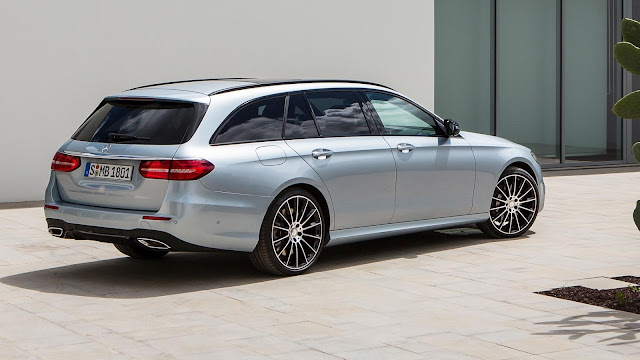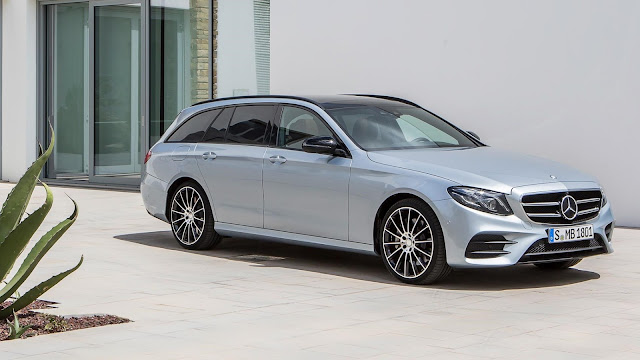Forget the millions of Euros feverishly swallowed by a painstaking R&D programme, as everything you need to know about the sixth-generation Mercedes-Benz E-Class Estate is encapsulated by two numbers: 640 and 64.
Stumped? The former is the latest E’s generous seats-up boot capacity, while that smaller figure represents the number of different colour choices for the LED interior lighting. No, seriously.
It’s reassuring that Mercedes evidently hasn’t forgotten how to make a capacious wagon, but the brand’s focus on technology and detailing could result in a dilution of the E-class’s appeal.
So, how does it measure up?
There’s precious little about the latest E-Class to remind you that you’re driving the Estate and not the similarly refined Saloon version. This 2.0-litre E220d, expected to be the best-selling variant, loses only a smidgen in the performance stakes compared to its four-door sibling. It clocks 146mph and a 0-62mph time of 7.7sec, versus 149mph and 7.3sec – but those aren’t significant differences in the real world.
Inevitably, there’s no escaping that the transformation’s apparent in your rear view mirror, but that aside, only a moderately amplified cabin echo over poorly surfaced or cobbled roads gives the wagon’s game away.
Adjusting the rake of the rear seats’ backrest by 10 degrees frees up a further 30 litres of storage space, while folding them to their virtually flat position – the 40:20:40 split further increasing the Merc’s flexibility – liberates 1820-litres of cargodom. Audi’s A6 Avant (565-1680 litres), BMW’s 5 Series Touring (560-1670 litres) and, disappointingly, Volvo’s fresh-faced V90 (560-1526 litres) all tip their tailgates to the E-Class in deference.
Shining like a beacon of common sense among the fog of multi-seated SUVs, Mercedes has dipped into its options annals to resurrect the pair of rear-facing kids’ perches in the boot – but you’ll have to wait until 2017 to be able to tick an options box for them.
Fans of the more traditional-looking chrome-smothered grille with the three-pointed star atop will continue to lament its unavailability here, but can surely raise a wry smile upon learning that you can only see the very top of the mascot from the driver’s seat anyway, so low is its mounting point.
Surely there’s more to the new E-class’s tech than an array of lights?
Wading through the glut of on-board electronica, there is technology of substance within the Mercedes: it offers systems that deliver as close as you can legally get to autonomous driving in 2016. Emphasis there is on the law-abiding part, so forget notions of wedging your laptop betwixt belly and steering wheel in order to make last-minute adjustments to your PowerPoint presentation while the Mercedes serenely does its thing – that’s still a few years away, unless you buy a Tesla and turn a blind eye to the rulebook.
Press the right buttons, pull the relevant steering column stalks as directed, and the E-Class’s Drive Pilot system will follow a well-judged course between the white lines, braking and accelerating for different speed limits all by itself – and only occasionally prompting you to keep your hands on the wheel. And for those among you who find slightly turning the steering wheel a chore when overtaking on motorways, rejoice! Instead, hold the indicator for two seconds to instruct the car to do the rest itself.
Mercedes has been lauded for the sophistication of the E-Class’s cabin but what really wows is, unsurprisingly, optional: you can specify two separate 12.3-inch displays – one an upgrade of the Comand multimedia system, the other consigning physical dials to the factory’s recycle bin. It’s contemporary and customisable, and an option well worth going for.
Is a 2.0-litre diesel enough to haul all that E?
With 191bhp and 295lb ft of torque at your right foot’s beck and call, we’d go as far as to suggest the E220d is all the E-Class Estate you’ll ever need. Few cars in any segment successfully blend such a well-judged combination of performance and efficiency, let alone a pricey estate tipping the scales at 1.78 tonnes. A genuine 50mpg is entirely plausible here.
The new 2.0-litre diesel is also alarmingly quiet compared with aged 2.1-litre unit it’s supplanted, although for those within the cabin this hushed perception is aided by the optional double-glazing.
The larger V6 diesel installed in the E350d offers a modicum of extra urgency but not enough to justify the expected £9,000 premium for the extra cylinder count, while petrol fans are restricted, so far, to the brawnier Mercedes-AMG E43.
Is there any fun to be had at all behind the wheel of the E-Class Estate?
Imperious comfort is the order of the day here, rather than grin-inducing tail-happy antics, particularly if you shell out a further £1495 (standard on the E350d) for the Air Body Control system. The E doesn’t roll or dive excessively, and Comfort mode makes it feel softer than a Frank Spencer put-down.
Sport offers a more sensible compromise, maintaining the E’s excellent composure but dialling out much of the floatiness otherwise present. Easily more preferable than cleaning up the consequences of forgetting the kids’ Kwells.
Passengers have ample space in which to relax, with the cabin feeling even airier courtesy of the glass roof and light trims, but think twice before opting for cream carpets in the boot.
Verdict
Let’s not beat about the bush here – it may as well be dug up and slotted into the colossal loadspace instead. Some estates are more engaging to drive, but none are as accomplished an all-rounder as the Mercedes E-Class Estate. The next 5-series Touring and XF Sportbrake are going to have to be very special to have a chance of toppling the Benz. (carmagazine.co.uk)








0 comments :
Post a Comment